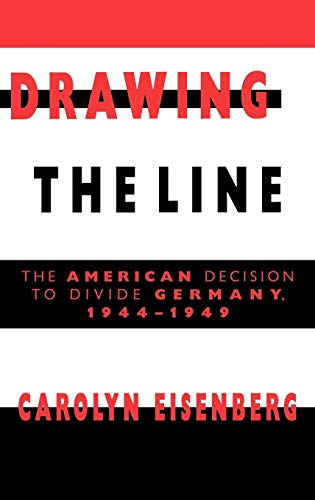Items related to Drawing the Line: The American Decision to Divide Germany,...

Synopsis
In this fresh and challenging study of the origins of the Cold War, Professor Eisenberg traces the American role in dividing postwar Germany. Drawing upon original documentary sources, she explores how U.S. policy makers chose partition and mobilized reluctant West Europeans behind that approach. The book casts new light on the Berlin blockade, demonstrating that the United States rejected United Nations mediation and relied on its nuclear monopoly as the means of protecting its German agenda.
"synopsis" may belong to another edition of this title.
From the Back Cover
In this fresh and challenging study of the origins of the Cold War, Professor Eisenberg traces the American role in dividing postwar Germany. Drawing on many original documentary sources, she examines the Allied meeting on the Elbe, follows the Great Powers through their confrontation in Berlin, and ends with the creation of the West German state in the fall of 1949. Unlike many works in the field, this book argues that the partition of Germany was fundamentally an American decision. U.S. policy makers chose partition, mobilized reluctant West Europeans behind that approach, and, by excluding the Soviets from West Germany, contributed to the isolation of East Germany and the emergence of the post-World War II U.S.-Soviet rivalry. The volume casts new light on the Berlin blockade, demonstrating that the United States rejected United Nations mediation and relied on its nuclear monopoly as the means of protecting its German agenda.
"About this title" may belong to another edition of this title.
US$ 10.77 shipping from United Kingdom to U.S.A.
Destination, rates & speedsSearch results for Drawing the Line: The American Decision to Divide Germany,...
Drawing the Line : The American Decision to Divide Germany, 1944-1949
Seller: Better World Books Ltd, Dunfermline, United Kingdom
Condition: Very Good. Ships from the UK. Used book that is in excellent condition. May show signs of wear or have minor defects. Seller Inventory # 50691131-20
Quantity: 2 available
Drawing the Line: The American Decision to Divide Germany, 19441949
Seller: Anybook.com, Lincoln, United Kingdom
Condition: Good. This is an ex-library book and may have the usual library/used-book markings inside.This book has hardback covers. In good all round condition. Dust jacket in good condition. Please note the Image in this listing is a stock photo and may not match the covers of the actual item,1000grams, ISBN:9780521392129. Seller Inventory # 3956278
Quantity: 1 available
Drawing the Line: The American Decision to Divide Germany, 19441949
Seller: Anybook.com, Lincoln, United Kingdom
Condition: Poor. This is an ex-library book and may have the usual library/used-book markings inside.This book has hardback covers. Book contains pen & pencil markings. In poor condition, suitable as a reading copy. No dust jacket. Please note the Image in this listing is a stock photo and may not match the covers of the actual item,950grams, ISBN:0521392128. Seller Inventory # 5828911
Quantity: 1 available
Drawing the Line: The American Decision to Divide Germany, 1944?1949
Seller: BennettBooksLtd, San Diego, NV, U.S.A.
hardcover. Condition: New. In shrink wrap. Looks like an interesting title! Seller Inventory # Q-0521392128
Quantity: 1 available
Drawing the Line: The American Decision to Divide Germany, 1944-1949
Seller: Best Price, Torrance, CA, U.S.A.
Condition: New. SUPER FAST SHIPPING. Seller Inventory # 9780521392129
Quantity: 2 available
Drawing the Line: The American Decision to Divide Germany, 1944â"1949
Seller: Toscana Books, AUSTIN, TX, U.S.A.
Hardcover. Condition: new. Excellent Condition.Excels in customer satisfaction, prompt replies, and quality checks. Seller Inventory # Scanned0521392128
Quantity: 1 available
DRAWING THE LINE. THE AMERICAN DECISION TO DIVIDE GERMANY, 1944-1949
Seller: Pórtico [Portico], ZARAGOZA, Z, Spain
Tapa blanda. Condition: New. 1ª edición. EISENBERG, C.: DRAWING THE LINE. THE AMERICAN DECISION TO DIVIDE GERMANY, 1944-1949. CAMBRIDGE, 1996, xiii 522 p. , 925 gr. Encuadernacion original. Nuevo. (KA-4-3) 925 gr. Libro. Seller Inventory # 21184
Quantity: 1 available
Drawing the Line: The American Decision to Divide Germany, 1944-1949
Seller: California Books, Miami, FL, U.S.A.
Condition: New. Seller Inventory # I-9780521392129
Quantity: Over 20 available
Drawing the Line (Hardcover)
Seller: Grand Eagle Retail, Mason, OH, U.S.A.
Hardcover. Condition: new. Hardcover. In this fresh and challenging study of the origins of the Cold War, Professor Eisenberg traces the American role in dividing post-war Germany. Drawing upon many original documentary sources, she examines the Allied meeting on the Elbe, follows the Great Powers through their confrontation in Berlin, and culminates with the creation of the West German state in the fall of 1949. In contrast to many works in the field, the book argues that the partition of Germany was fundamentally an American decision. US policy-makers chose partition, mobilized reluctant West Europeans behind that approach, and, by excluding the Soviets from West Germany, contributed to the isolation of East Germany and the emergence of the post-World War II US-Soviet rivalry. The volume casts new light on the Berlin blockade, demonstrating that the United States rejected United Nations mediation and relied on its nuclear monopoly as the means of protecting its German agenda. This study of the origins of the Cold War traces the American role in dividing post-war Germany. It explores how US policy-makers chose partition and mobilised reluctant West Europeans behind that approach. The book casts new light on the Berlin blockade, showing that the United States relied on its nuclear monopoly to protect its German agenda. Shipping may be from multiple locations in the US or from the UK, depending on stock availability. Seller Inventory # 9780521392129
Quantity: 1 available
Drawing the Line: The American Decision to Divide Germany, 1944-1949
Seller: Ria Christie Collections, Uxbridge, United Kingdom
Condition: New. In. Seller Inventory # ria9780521392129_new
Quantity: Over 20 available

